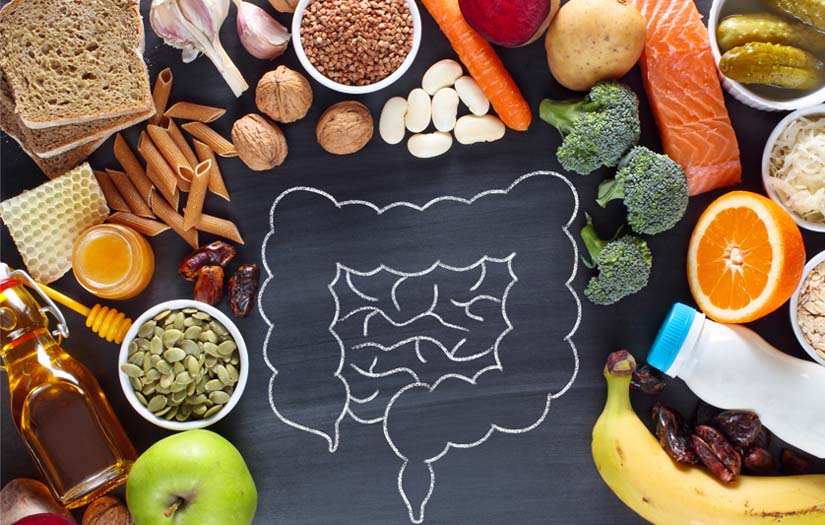The gut is also known as the second brain. While our gut can't solve math equations, it is responsible for helping us digest and disperse proper nutrients that play integral roles in our overall health, immunity, mental function, and energy levels. In a sense, the old saying "you are what you eat" has some truth to it. What you eat daily, the medications you take, and the amount of fluid you're consuming daily can play significant roles in your gut integrity.
Various times of the year can significantly influence our meal choices… so now that the holidays are officially over. Perhaps the new season can encourage you to do a "spring cleaning" of your gut.
As previously mentioned, the gut or collection of bacteria within the gut plays major roles in health, immunity, and mental function. So, what are some risk factors for having an "unclean" gut?
Want more information on how you can put an emphasis on your overwell wellness? Click here to learn about our Certified Wellness Coach course!
Poor Immunity
Improper balance of gut bacteria or lack of certain bacteria can increase the risk for sickness and diseases. Many bacteria in the gut are directly responsible for secreting antibodies that protect against harmful pathogens. For example, a collection of bacteria from the genus Lactobacillus is important for protecting against type 2 diabetes and colon cancer (1).
Many other auto-immune disorders such as Crohn's and Rheumatoid arthritis are also influenced by gut bacteria. In studies looking at patients that suffer from IBD, they found a reduction in Firmicutes and Bacteroides and an overgrowth of the species proteobacteria (2). Similarly, in patients with arthritis, some dysbiosis or imbalance of gut bacteria was found (2).
Poor Weight Management
It has been well-documented that the gut microbiome directly impacts nutrient metabolism and energy expenditure. A diet lacking in whole foods/nutrient diversity or overuse of antibiotics can cause an imbalance of bacteria within the gut.
Such dysbiosis disrupts the absorption, breakdown, and storage of nutrients and promotes inflammatory signaling throughout the body — contributing to weight gain or difficulty losing weight (5). Many studies have documented clear differences in the gut microbiome of obese vs lean individuals, showing more diversity in healthy, lean subjects.
Decreased Mental Function
The gut sends signals to the central nervous system! Outside of hunger signals, a poor diet can feedback signals to the brain that contribute to feelings such as stress, anxiety, and depression. Studies have shown that stress directly acts on the digestive system and can decrease the absorption of essential vitamins and minerals.
With how heavily gut health influences various physiological factors it is important to emphasize consuming a well-balanced diet to:
• Boost Immunity: Bacteria within the gut play direct roles in various inflammatory and anti-inflammatory pathways. Inflammation plays a direct role in your immune system to fight off sickness, and decrease the risk for diseases such as cancers, diabetes, and heart disease.
• Improve Digestion: GI disorders and intolerances to certain foods can be due to a lack of specific bacteria or an overgrowth of bacteria. Ensuring a well-balanced diet can promote a diverse microbiome to alleviate bloating and improve the breakdown and absorption of various nutrients.
• Decrease Inflammation: A healthy gut helps fight off inflammation! The promotion of anti-inflammatory pathways can help regulate blood sugars, which can decrease the risk of diabetes and heart disease. It can also help regulate weight loss and decrease the risk of various metabolic diseases.
So, what are some ways you can promote gut health and increase the good bacteria needed to keep your overall wellness strong, healthy, and feeling good?
Increase Fiber Intake
Fiber is the food that bacteria thrive of off. Fiber is the undigested portion of plants that bacteria break down to release short-chain fatty acids. Short-chain fatty acids affect other metabolic processes that essentially help fight inflammation, can improve insulin resistance, and protect against metabolic diseases. Fiber also helps bacteria break down and synthesize various nutrients as well such as Vitamin K and biotin.
Foods high in fiber include fruits, vegetables, seeds, legumes, and whole grains! Ideally, the goal is to consume roughly 25-30g of fiber per day.
Want to see how you can bring wellness to life? Learn more through our Certified Wellness Coach course.
Mix and Match Your Cooking Styles
Various nutrients exist in fruits and vegetables, however, the method by which you cook them can change their nutrient profile and bioavailability. For example, carrots are very rich in Vitamin A, however, boiling or steaming carrots allows for more vitamin absorption compared to when eaten raw.
In contrast, boiling vegetables high in vitamin C such as bell peppers can lower their vitamin content. Ideally, it is important to constantly rotate your methods of cooking with various vegetables to promote a healthy gut.
Consume Foods High in Both Probiotics and Prebiotics
Probiotics are live organisms found in food while prebiotics is foods that feed healthy gut bacteria. Consuming foods naturally high in both probiotics and prebiotics can stimulate a large variety of bacteria within your gut to have a diverse microbiome.
Foods high in probiotics include dairy products such as Greek yogurt, kefir, and cheeses. Fermented products are also rich in probiotics such as kombucha, kefir, sauerkraut, miso soup, tempeh, and kimchi.
Examples of prebiotics include green bananas, beans, garlic, onions, legumes, and whole grains.
Avoid High Fructose Corn Syrup and Sugar Alcohols
High fructose corn syrup (HFCS) and sugar alcohols have been reported to disrupt healthy gut bacteria and create inflammation which can lead to gas and bloating. One study in mice showed that HFCS significantly increased body weight, disrupted genes that influence lipid metabolism, and caused dysbiosis (7). While the use of sugar alcohols or non-nutritive sweeteners is still being debated, there has been documentation of sucralose causing changes to gut bacteria (8).
Take Gut-Boosting Supplements
Other than probiotics you can find at the grocery store, supplements such as glutamine and collagen can also help with gut integrity. Glutamine helps maintain cell health within the gut to prevent issues like "leaking", as well as decrease inflammation. In some studies, collagen has been shown to help promote more regular bowel movements and reduce bloating (4). Looking for natural gut-healing food? Try bone broth!
The gut is the main driver of our body's well-being. It is where all our food is broken down to absorb and store essential nutrients, it provides us with energy, keeps us safe from harmful pathogens, balances our hormones, sends signals to our brain that interplay on mental stress and resilience, and can protect us against many diseases.
Placing importance on gut health influences every other metabolic and physiological process within the body. Therefore, to become healthier, you must heal from within. Taking steps to consume more whole foods, eliminate fried and processed products, and include a daily probiotic in your regimen can significantly improve your health.
References
https://atlasbiomed.com/blog/why-is-lactobacillus-so-important-for-health/
https://www.ncbi.nlm.nih.gov/pmc/articles/PMC3337124/
https://www.ncbi.nlm.nih.gov/pmc/articles/PMC7146107/
https://www.ncbi.nlm.nih.gov/pmc/articles/PMC9198822/
https://www.ncbi.nlm.nih.gov/pmc/articles/PMC7333005/
https://www.ncbi.nlm.nih.gov/pmc/articles/PMC5082693/
https://www.ncbi.nlm.nih.gov/pmc/articles/PMC9280673/
https://www.ncbi.nlm.nih.gov/pmc/articles/PMC6363527/

















